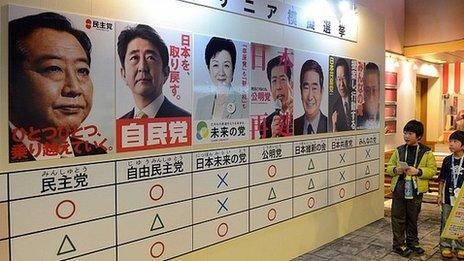Japan loses faith in traditional politics
- Published

The traditional view of Japanese elections is that they are boring - prime ministers come, prime ministers go, but nothing really changes and Japan carries on regardless.
For more than half a century, it was right.
But in the past few years Japanese politics has changed. More importantly the Japanese public has changed - they have lost faith in the traditional political parties.
Three years ago they kicked out the old Liberal Democratic Party (LDP) and gave a landslide win to the Democratic Party of Japan.
This weekend they will do exactly the opposite - kicking out the Democrats and handing power back to the LDP. But they like neither of them.
Japanese politicians only have themselves to blame. Since the Japanese economic bubble burst in 1992, Japanese people have lived through 20 years of stagnation and deflation.
Ask any economist of any stripe what Japan needs and they will give you a very similar list.
Regulation needs to be loosened, foreign investment welcomed and women empowered to stay at work while raising families.
The government should invest in education and science, rather than in endless pork barrel infrastructure projects that Japan doesn't need. And people will need to pay more tax if Japan is to avoid one day going bankrupt.
Instead, Japanese politicians have put off and put off reform, while borrowing more and more to pay for spending. Public debt now stands at around 230% of GDP, higher than Greece or any other country in the Organisation for Economic Co-operation and Development (OECD).
To add insult to injury, Japan has been hit hard by the global financial crisis.
Looking for a safe haven, foreigners have bought vast amounts of Yen, pushing its value up more than 40% since 2008. Japanese exporters' profits have been squeezed to nothing.
So what does this all mean for Sunday's election?
Two things. Firstly voters will want to punish the party in power. Many will do this by voting for the LDP.
Secondly, ask any member of the public what Japan needs now and they will say "leadership". There is growing support here for non-traditional parties, particularly right-wing populists who promise strong leadership and bold answers.
The most prominent is the Japan Restoration Party led by two political mavericks - Toru Hashimoto, the Mayor of Osaka, and 80-year-old Shintaro Ishihara, the former governor of Tokyo.
On the campaign trail, Mr Hashimoto and Mr Ishihara have drawn thousands of eager listeners wherever they stop. Last weekend in Tokyo I heard Mr Hashimoto calling for the slashing of government waste, cutting bureaucracy and making English an integral part of Japanese education. The crowd loved him.
But he and Mr Ishihara hold some extreme right-wing views.
In a speech last year Mr Hashimoto said: "What Japan needs now is dictatorship".
Mr Ishihara has made so many outrageous statements it's hard to know where to start. He once said: "Women who live beyond their child-bearing years are useless and are committing a sin."
History questioned
He has called for a military regime and says Japan should build nuclear weapons. Both men are deeply hostile to China and have revisionist views on Japanese history.
And so does the man who will probably become Japan's next prime minister - LDP leader Shinzo Abe.
Although he is the leader of the "old" LDP, Mr Abe is far more right wing than most of his predecessors. In particular he has very right-wing views on the history of Japan's aggression during World War II.
He has repeatedly denied that the Japanese military forced Chinese, Korean and women from other Asian countries into sexual slavery - the so-called "comfort women".
Mr Abe even supports revoking a Japanese government statement, made in the early 1990s, acknowledging and apologising for what Japan did.
Most Japanese people do not share Mr Abe's views on history. And most will not vote for him, or Mr Hashimoto or Mr Ishihara, because they want a right-wing nationalist government that is hostile to China.
But it is still possible that is what they will get.
- Published14 December 2012
- Published14 December 2012
- Published23 October 2017